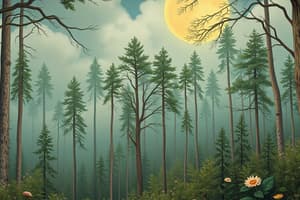Podcast
Questions and Answers
What is the taiga biome?
What is the taiga biome?
The taiga is the biome of the needleleaf forest.
What are the characteristics of the taiga biome?
What are the characteristics of the taiga biome?
- Warm summers (correct)
- Many species of plants and animals
- Hibernation of animals in winter (correct)
- Cold and lonely environment (correct)
Where is the taiga located?
Where is the taiga located?
It stretches over Eurasia and North America, just below the tundra biome.
Which types of animals are commonly found in the taiga?
Which types of animals are commonly found in the taiga?
What is the average temperature in the taiga during winter?
What is the average temperature in the taiga during winter?
Which of the following trees are classified as coniferous in the taiga?
Which of the following trees are classified as coniferous in the taiga?
The summers in the taiga are extremely short and dry.
The summers in the taiga are extremely short and dry.
What adaptations do coniferous trees have in the taiga?
What adaptations do coniferous trees have in the taiga?
What is the characteristic shape of evergreens in the taiga?
What is the characteristic shape of evergreens in the taiga?
What are the main seasons in the taiga?
What are the main seasons in the taiga?
Flashcards are hidden until you start studying
Study Notes
Taiga Biome Overview
- The taiga, also known as the boreal forest, is characterized by needleleaf forests primarily composed of coniferous trees.
Taiga Characteristics and Conditions
- Cold, harsh conditions dominate the taiga, particularly in winter.
- Food shortages create difficulties for wildlife during winter; some animals hibernate, others migrate, while some adapt to the environment.
- Winters are characterized by significant snowfall; summers are warm, humid, and rainy.
- Coniferous trees thrive due to their adaptation to the climate.
Taiga Location
- The taiga extends across Eurasia and North America, positioned just below the tundra biome at high northern latitudes.
Animal Characteristics in the Taiga
- Species diversity is lower than in tropical or deciduous forests, but millions of insects proliferate during summer.
- Many bird species migrate to the taiga seasonally for nesting and feeding opportunities.
Temperature, Weather, and Climate
- The average temperature remains below freezing for about six months annually.
- Winter temperatures range from -54 to -1° C (-65 to 30° F).
- Summer temperatures can drop to -7° C (20° F) and rise to 21° C (70° F); summers feature 50 to 100 frost-free days.
- Total annual precipitation ranges from 30 to 85 cm (12 to 33 in), with summer rains being predominant.
- The taiga is prone to wildfires, leading to adaptations in tree species, such as thick bark.
Seasons in the Taiga
- The taiga mainly experiences two distinct seasons: winter and summer, with spring and autumn being extremely brief.
Plant Characteristics
- Limited plant species can survive the taiga's extreme cold, mainly consisting of coniferous trees such as pine, hemlock, and spruces, alongside some lichens and mosses.
Coniferous Trees Adaptations
- Coniferous trees, or evergreens, possess long, waxy needles that provide protection against freezing and desiccation.
- Unlike deciduous trees, evergreens retain their needles year-round to maximize photosynthesis during warmer seasons.
- Their conical shape enables snow to slide off, preventing branch breakage.
Animal Life in the Taiga
- Predatory animals include lynx and various members of the weasel family, which prey on herbivores like snowshoe rabbits and red squirrels.
- Larger ungulates such as red deer, elk, and moose inhabit areas with more deciduous trees.
- Seasonal insect-eating birds breed in the taiga but leave post-breeding; year-round residents include seed-eating finches and omnivorous crows.
Studying That Suits You
Use AI to generate personalized quizzes and flashcards to suit your learning preferences.




